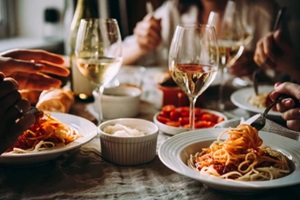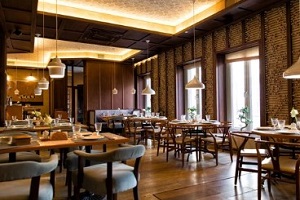 With a few exceptions, establishments serving food need restaurant insurance, but policies vary based on the business’s size, scope, and risk profile. We will explain the types of restaurants that need food insurance and the coverage options. Then, you can take the steps to get the coverage necessary to protect your restaurant and employees.
With a few exceptions, establishments serving food need restaurant insurance, but policies vary based on the business’s size, scope, and risk profile. We will explain the types of restaurants that need food insurance and the coverage options. Then, you can take the steps to get the coverage necessary to protect your restaurant and employees.
Restaurant Insurance for Traditional and Home-Based Food Operators
Most people associate food insurance with traditional restaurants like fast-food establishments, buffets, and full-service eateries. However, specialty restaurants and home-based businesses, including bakeries, caterers, and cottage food operators, also benefit from insurance.
Since the type of coverage is based on the specific business, policies vary greatly. Keep your restaurant’s specific needs in mind while reviewing the different types of insurance.
Types of Restaurant Insurance
Food insurance comes in many forms, from basic workers’ compensation plans to more robust business owners’ policies. Find out how these policies protect restaurants to determine the coverage you need.
Workers’ Compensation Insurance
All restaurants with at least one full or part-time employee must carry workers’ compensation insurance to cover medical bills, lost wages, and other expenses if an employee is injured. Employers who fail to maintain workers’ compensation insurance face a minimum fine of $10,000 and potential lawsuits from injured employees.
General Liability Insurance (Part of a Business Owner’s Policy)
There are risks involved when working with the public. For example, customers may slip and fall or develop a food-borne illness after eating at an establishment. Some risks could be clearer, making them easier to avoid.
For instance, a customer sued a California restaurant, claiming the spicy food caused emotional stress and physical injuries. General liability insurance covers medical bills and legal fees when customers file claims due to injuries or illnesses. Also, this policy protects restaurant owners against advertising injury claims.
Commercial Property Insurance (Part of a Business Owner’s Policy)
 From theft and vandalism to fire and water damage, restaurants face many threats. Commercial property insurance covers the building and its belongings, allowing restaurant owners to seek reimbursement to repair or replace damaged or stolen property.
From theft and vandalism to fire and water damage, restaurants face many threats. Commercial property insurance covers the building and its belongings, allowing restaurant owners to seek reimbursement to repair or replace damaged or stolen property.
Business Income Insurance (Part of a Business Owner’s Policy)
Occasionally, restaurants must shut their doors temporarily due to situations outside the owner’s control. For instance, a Peoria eatery temporarily closed due to staff illness. Business income insurance covers the losses caused by temporary closures. Owners can use the policy to pay business expenses, including wages, and recover lost income.
Auto Insurance
Commercial auto insurance and hired and non-owned auto coverage are both restaurant options. While commercial auto insurance covers vehicles the restaurant owns, hired and non-owned auto insurance extends additional coverage when using rental cars and employee vehicles for business purposes.
Without this coverage, the restaurant would have to pay for damages if an employee damages property or injures someone when driving for work.
Employment Practices Liability Insurance
The restaurant industry’s turnover rate is higher than the national average, so disgruntled employees are concerned. Employees might claim wrongful termination,discrimination, or harassment, making employment practices liability coverage essential. The policy covers settlements and legal defense if an employee makes a claim against your establishment.
Liquor Liability Insurance
Illinois’s Dram Shop Act holds restaurants and bars partially liable when an intoxicated patron causes physical injuries or property damage. For instance, if an overserved person gets in an accident after leaving the restaurant, the injured party can file a claim against the establishment.
Restaurant owners typically train employees to reduce the risk of overserving customers. Still, it is critical to get liquor liability insurance in case someone brings a civil action against the restaurant.
Water Contamination Insurance
Access to clean water is essential for operating a restaurant. Restaurants must switch to bottled water or temporarily close if the water becomes contaminated. With water contamination coverage, restaurants can shut down until the problem is fixed without suffering financial losses.
Food Spoilage Insurance
Power outages and equipment breakdowns can cause food to spoil and must be replaced to keep the eatery operational. Owners can use food spoilage insurance to replace the food instead of paying out of their pockets.
Food Contamination Endorsement
 The Illinois Department of Health has the authority to close restaurants responsible for food-borne illness outbreaks temporarily. After closing, restaurants must replace the food, clean equipment, and pay medical fees for ill employees, if applicable. Additionally, restaurants often spend more money on advertising to mitigate the reputation damage caused by the closure.
The Illinois Department of Health has the authority to close restaurants responsible for food-borne illness outbreaks temporarily. After closing, restaurants must replace the food, clean equipment, and pay medical fees for ill employees, if applicable. Additionally, restaurants often spend more money on advertising to mitigate the reputation damage caused by the closure.
Restaurant owners who do not want to assume these financial risks can add food contamination endorsements to their insurance policies. A food contamination endorsement covers the costs, including the higher advertising budget.
How to Get a Customized Food Insurance Quote
By choosing the appropriate level of insurance coverage, you will have ample protection without buying extras you do not need. First, gather information related to your restaurant, such as the square footage, volume of sales, current and projected sales, and the activities on the premises.
Contact Pro Insurance Group for a customized quote. Your insurance agent will compare quotes and coverage options to help you select the best one for your restaurant and finances.
